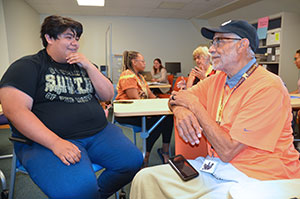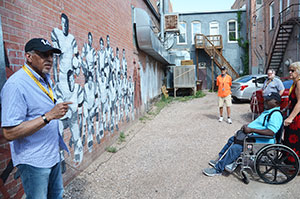
Contact Us
Institutional Communications
Bureau of Mines Building, Room 137
Laramie, WY 82071
Phone: (307) 766-2929
Email: cbaldwin@uwyo.edu
Students Learn History of Black 14 in UW Summer Institute
Published July 29, 2022

Cheyenne South High School student Angel Arenas, left, interviews Lionel Grimes, from
Reynoldsburg, Ohio, a member of the University of Wyoming Black 14 players who were
dismissed from the Cowboys football team in 1969. Arenas was among participants in
the first Black 14 Social Justice Summer Institute last week on the UW campus to learn
the true history of the players’ dismissal. (UW Photo)
John Griffin hopes that the story of how he and his “13 brothers” were kicked off of the University of Wyoming football team 53 years ago will never be forgotten. Newer generations of students should learn the truth to honor their legacy.
Last week, students from Wyoming, Colorado and Ohio participated in the inaugural Black 14 Social Justice Summer Institute, learning how the players spoke out against racism and oppression. The surviving members today continue to be active in social justice movements since the events of 1969 on the UW campus. The weeklong institute also will help in the recruitment and success of Black students at UW.
“What really impressed me was when the students arrived (last) Sunday. They didn’t know us from Adam, and we didn’t know them. However, come the next day, we started talking about the Black 14 event,” says Griffin, who lives in Denver. “The students jumped in wholeheartedly. They took on the responsibility to tell our story, all 12 of them. It was very impressive. As the week went on, the more involved they became, and they began to put together great questions for the three of us to answer.”
Also joining Griffin throughout the week were teammates Lionel Grimes, of Ohio, and Mel Hamilton, of South Carolina, who told students their histories and how their actions contributed to the larger civil rights and Black Power movements.
During the institute, students worked on a lasting exhibition; took tours of the UW campus; and participated in social activities with various campus groups. Participants also had the opportunity to research contemporary issues related to and important to the Black community at the local, state, national and worldwide levels. Through their interviews with the players, students were tasked with writing 500-word essays.
“The week was an extraordinary opportunity to learn, grow and inspire one another. The students were deeply moved by the firsthand accounts from members of the Black 14,” says Erin Olsen-Pueblitz, one of the three co-chairs of the institute and UW Human Resources’ manager for inclusivity initiatives. “The experiences will hold a significant place in all of our lives and create such an important foundation for future years as we continue to grow this program.”
During fall 1969, the 14 UW football players were dismissed from the team by head football Coach Lloyd Eaton because they appeared at the coach’s office as a group, wearing street clothes with black arm bands, on the day before a game against Brigham Young University. The players wanted to discuss with the coach how they might show solidarity with a Black Students Alliance call to protest the Church of Jesus Christ of Latter-day Saints’ policy of prohibiting Black persons from attaining the priesthood (the church removed the ban in 1978).
UW’s Board of Trustees met in an emergency session that night and issued a press release at about 2 a.m., saying the players were dismissed for violating a “coaching rule” that prohibited scholarship football players from participating in demonstrations at any time (many of the Black 14 players have said they had not heard of such a rule before they were dismissed). That rule was modified the next week to apply only to official football activities, but the modification was made to go into effect only after the season ended -- and so the players were not reinstated.
UW and the former student-athletes have moved forward to ensure that the lessons of one of the most turbulent times in the university’s history are not forgotten. On the 50th anniversary of being dismissed from the team, UW officially offered a letter of apology in 2019 to the dismissed players. The culminating event of the weeklong celebration in 2019 was when team members were recognized at halftime of the UW-University of Idaho football game, where they were given UW letter jackets.
Among initiatives to honor the players was the creation of the Black 14 Social Justice Summer Institute.

John Griffin, left, from Denver, a Black 14 member, talks about his teammates’ history
in front of a mural in downtown Laramie dedicated to the players who were dismissed
from the UW Cowboys team 53 years ago. Griffin, along with teammates Lionel Grimes,
in orange shirt, and Mel Hamilton, in blue shirt, attended last week’s Black 14 Social
Justice Summer Institute to meet with participating students to tell their story firsthand.
(UW Photo)
One of the event’s students, Meeshla Bovee, a rising Casper Kelly Walsh High School senior, had heard the Black 14’s story her entire life.
“My grandmother was a freshman on the UW campus at that time and told us the Black 14 story over the years, and I grew up knowing it,” Bovee says. ”I thought it was pretty common to know their story until I got into high school. But I realized it’s not talked about, not taught. It’s a forgotten part of history, and I feel that it’s wrong. It’s a huge part of history that we should all know.”
She hopes more students participate in future Black 14 institutes.
“It’s a phenomenal opportunity to talk to these men, because they are still here with us and they are a primary source. Most primary sources are long gone, and you can’t ask them questions,” Bovee adds. “But, these three men remember it like it was yesterday, so this is a great program and has been a great opportunity to learn.”
Grimes says he did not talk about the 1969 experience with his family for many years and, in fact, his great-nephew just recently learned what his great-uncle and his teammates had to endure. Jayce Crockett, of Alliance, Ohio, traveled to Wyoming with his great-uncle for the first time to learn more of the Black 14’s history and came away impressed with the program and the players’ legacy.
As part of the institute, the students incorporated their study of the history and legacy of the Black 14 into an exhibition exploring the events and their aftermath. Using materials from UW’s American Heritage Center (AHC) manuscript collection, the students installed an exhibition in one of the AHC galleries as well as creating a digital exhibition to be hosted on the center’s website. Once the exhibition is completed, it will be available on the AHC website at www.uwyo.edu/ahc/.
“Watching students connect on a personal level to the history of the Black 14 and student activism is one of the best things that a historian can ask for, and it doesn’t get better than the week of the institute,” says Mary Beth Brown, one of the event’s co-chairs and the AHC’s Toppan archivist.
Also, in conjunction with UW’s Black 14 Social Justice Summer Institute, the UW Art Museum is featuring “Black 14,” a 2018 documentary short film from director Darius Clark Monroe and executive producer Spike Lee. The documentary can be viewed in the Pat Guthrie Special Exhibitions Teaching Gallery through Saturday, Aug. 6.
The documentary features 1969 footage and interviews with Black 14 players, Eaton, UW President William Carlson and Gov. Stan Hathaway. The installation also includes footage of the 1969 protests in Laramie, courtesy of the AHC.
“The UW Art Museum is proud to participate with partners across campus in honoring the legacy of the Black 14,” says museum Curator Michelle Sunset. “We are thrilled to have a new essay by Dr. Tracey Owens Patton to accompany the film -- featuring original 1969 footage -- in the exhibition brochure for visitors to take home and reflect on.”
Owens Patton is a professor in the UW Department of Communication and Journalism.
Co-chair Kaila Mills, UW’s Equal Opportunity Report and Response office manager, says the institute had a “really special group of students” as the first group to go through the program and to create a lasting experience for future cohorts.
“Having the Black 14 institute come into fruition is really special and shows the university’s commitment to doing what is right,” Mills says. “It’s been an incredible experience, especially having three members of the Black 14 here in person, along with others who joined us virtually. We all will remember this experience forever.”
Griffin says the players’ hope of telling their story to a wider audience “has come to fruition.”
“I am so proud of these young folks, and we want to see more growth in this program. We want to double the number of student participants next year and then, the following year, we want to exceed that goal,” he adds. “We want to make this the kind of program that is going to stand the test of time and become a staple in the university’s programming.”
Contact Us
Institutional Communications
Bureau of Mines Building, Room 137
Laramie, WY 82071
Phone: (307) 766-2929
Email: cbaldwin@uwyo.edu
